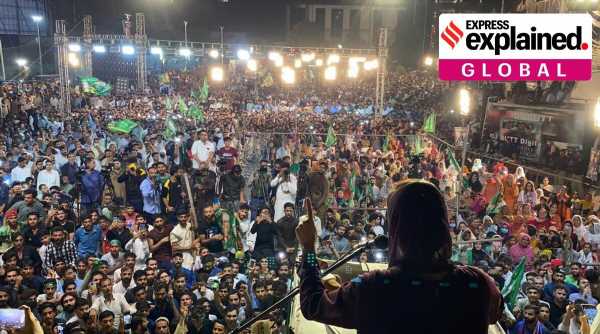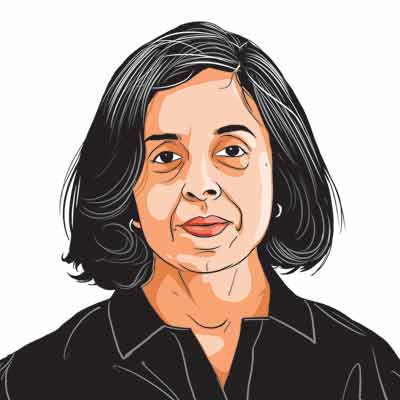Some 20 lakh voters in Pakistan Occupied Kashmir will vote for a new five-year Assembly tomorrow. For all practical purposes though, the territory is run directly by the Pakistan government and Army.
Get email alerts for your favourite author. Sign up here
Elections are scheduled to be held in Pakistan Occupied Kashmir (PoK) on Sunday. The PoK Assembly has 53 seats, including four that were added in 2019. Over 700 candidates are in the fray, and there are about 20 lakh voters.
Constitutional position
PoK, which Pakistanis call “Azad Jammu & Kashmir” (“AJK” in short), came into being after the 1949 ceasefire between India and Pakistan after the Kashmir war, and comprises the parts of the erstwhile state of Jammu and Kashmir that were occupied by the Pakistani forces.
Pakistan’s constitutional position on PoK is that it is not a part of the country, but the “liberated” part of Kashmir. The constitution of Pakistan lists the country’s four provinces — Punjab, Sind, Balochistan, and Khyber Pakhtunkhwa.
However, Article 1 of the constitution, which lists out the territories of Pakistan, also has a provision for “such States and territories as or may be included in Pakistan, whether by accession or otherwise”.

In effect, central rule
The territory of PoK comprises 10 districts under three divisions — Mirpur, Muzaffarabad, and Poonch. The capital is Muzaffarabad.
While PoK is ostensibly an autonomous, self-governing territory, the Pakistan Army is the final arbiter on all matters Kashmir — and the security establishment exercises tight control over what goes on in PoK. At the height of the militancy in the Kashmir Valley, many of the training camps for militants were located in PoK.
The PoK constitution has a clear injunction against persons or political parties propagating “against or taking part in activities prejudicial to the ideology of the state’s accession to Pakistan”. An Assembly member invites disqualification for doing this, and candidates have to sign an affidavit swearing allegiance to Kashmir’s accession to Pakistan.
For all practical purposes, PoK is run by the Pakistan government through the all-powerful Kashmir Council, a nominated 14-member body headed by the Prime Minister of Pakistan. Six members are nominated by the Pakistan government and eight are from the PoK Assembly and government, including the “prime minister” of “Azad Kashmir”.
Seats and legislators
The first direct elections in the territory were held in 1970. “AJK” got its own “interim” constitution (pending a final settlement of the Kashmir issue) in 1974, the same year that Pakistan got its first full fledged constitution.
Forty-five of the 53 seats in the Assembly are for directly elected members — 33 are from constituencies in “AJK”, while 12 are “refugee constituencies” in Pakistan’s four provinces, representing those who migrated from the Indian side to Pakistan in 1947.
The remaining eight seats in the Assembly are filled via nomination: five women, one professional, one a PoK resident settled abroad, and one from the ulema.
The Assembly has a five-year term. The legislators elect a “prime minister” and a “president” for the territory.
In election results, a pattern
The parties and contestants in the fray in elections in PoK mirror the politics of Pakistan. The winning party is usually the ruling party in Islamabad, and the losing side usually makes the allegation that the “ agencies” — a reference to Pakistani intelligence agencies — gave the winners a helping hand.
The last elections in PoK were held in 2016 when the Pakistan Muslim League (N) led by Nawaz Sharif was in power in Islamabad. The PML(N) won a comfortable majority, and Raja Farooq Haider was elected prime minister of “Azad Kashmir”, and Masood Khan the president.
In keeping with the pattern, it is widely expected that Imran Khan’s Pakistan Tehreek-e-Insaf (PTI), which came to power in 2018, will win the PoK election.
However, PML(N) rallies, addressed by Nawaz Sharif’s daughter Maryam, have been attracting huge crowds. Bilawal Bhutto Zardari, chairman of the Pakistan People’s Party, has also addressed several rallies.
Newsletter | Click to get the day’s best explainers in your inbox
Valley in the campaign
In every election campaign, the situation in the Kashmir Valley figures prominently, although the governance record of the ruling party in Islamabad and in Muzaffarabad are also high on the list of campaign issues.
The last election in PoK was held days after the killing of militant leader Burhan Wani by security forces in Kashmir. Prime Minister Nawaz Sharif, then beginning to feel the heat of the Panama Papers case and other corruption charges (he would be unseated by the judiciary a year later) held up Wani as a “martyr”, denounced the alleged human rights violations by Indian forces, declared election day as a “Black Day” in solidarity with the people of the Kashmir Valley, and pronounced his party and government’s support for the “just struggle for self-determination” of Kashmiris.
This year, the focus is on India’s actions of August 5, 2019 to change the constitutional status of Jammu and Kashmir.
Maryam Nawaz, Bilawal Bhutto Zardari, Imran Khan
In her campaign speeches, Maryam Nawaz has been accusing the Imran Khan government of giving legitimacy to Indian actions in Kashmir by secretly hatching a plan to make PoK a province of Pakistan. At a public meeting in Dhirkot, she said Khan wanted a “puppet PM” in “AJK” to follow through on this plan, but warned “the PML(N) will not allow this.” The outgoing PML(N) “prime minister” of PoK had made similar allegations in the Assembly last month.
At a rally in Muzaffarabad earlier this month, Bilawal said voters must “send a message on both sides of the divide” that the “sell-out of Kashmir is unacceptable”, a reference to Prime Minister Khan’s allegedly muted reaction to India’s August 2019 steps.
“When we say the sell-out of Kashmir is unacceptable, it also means whatever is happening in occupied Kashmir is unbearable to us. When we say we don’t pray for (Indian Prime Minister Narendra) Modi’s success in elections and don’t invite him at our weddings, we give a message that we stand shoulder-to-shoulder with the Kashmiri Muslims and we are ready to confront Modi boldly,” Dawn quoted Bilawal as saying.
In a speech on Friday, Imran Khan dismissed allegations that he had sold out Kashmir or that he planned to turn PoK into a province of Pakistan. He spoke of how “a day would come when the UN-mandated referendum would be held” to allow the people of Kashmir to decide if they wanted to join India or Pakistan, and added that he was confident they would choose Pakistan, Geo reported.
Source: Read Full Article



